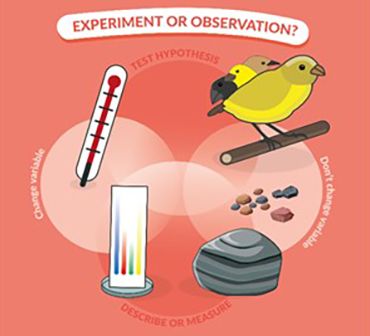Supporting the teaching, learning and assessment of practical science
Researchers from the Department of Education have worked with teachers, pupils and exam boards to develop new approaches to teaching practical science in secondary schools.

‘Despite the best attempts of teachers, the practical science taught in secondary schools is often formulaic,’ explains Professor Sibel Erduran. ‘There is usually an overemphasis on so-called ‘experiments’ – which are often in reality a recipe of predictable steps – and little consideration of authentic scientific practices and the thinking behind these. We wanted to diversify the scientific methods used in practical science lessons and help equip pupils to develop the scientific skills they need in the modern world.’
Project Calibrate ran from January 2018 to December 2020 and worked with teachers, pupils, and professional organisations to develop new online teaching resources and assessments, and to evaluate teacher feedback and pupil learning outcomes from the new approach.
The materials supported the teaching of a diverse range of scientific methodologies – such as observation, measurement and the use of hypotheses – as well as more traditional experimentation. Project outputs included video-based teaching and learning resources, model examination questions, and professional development materials for teachers. Teaching and learning resources were used by nearly 1000 pupils and more than 150 teachers across the UK, and nearly 100 teachers were trained to use the new approach.
Sibel Erduran comments: ‘We were delighted that so many teachers and pupils opted to use the resources, which were particularly timely as the COVID pandemic forced most teaching online at that time. Our evaluations indicate that the approaches achieved a significant improvement in pupil attainment and 75% of the teachers involved gave positive feedback.’
‘Often curriculum development happens in isolation from pupil assessment,’ she continues. ‘But working in partnership with AQA, the largest examination board in the UK, allowed us to ensure that assessment was built into the project from the outset and that, in this case, the tests that pupils were ‘working to’ were meaningful because they examined a richer understanding of scientific methods than traditional assessments.’
Project research findings have since been shared through peer-reviewed academic papers and practitioner-oriented publications as well as national and international engagement activities involving researchers, practitioners, and education specialists.
Erduran comments: ‘We’re delighted at the project’s potential to help move practical science towards a more ‘minds-on’ approach which engages pupils in authentic scientific reasoning and offers a more realistic picture of what scientific investigation and enquiry entail. Hopefully this will spark student interest and imagination, help them achieve better results in formal examinations, and encourage some to go on to further study.’
Erduran adds: ‘But whether pupils continue to study science or not, the approaches can help them develop the ‘scientific literacy’ that is vital for citizens in the modern world. People who understand the scientific process, and how the examination of evidence leads to scientific theory, are more likely to have confidence in strategies to tackle health and environmental challenges such as climate change or COVID-19, and to support appropriate public policies.
‘We’re delighted at the response of pupils and teachers to the initial phase of Project Calibrate. The assessments are currently being incorporated into a database of teacher resources to ensure they can be accessed more widely, and I encourage anyone interested in the project to get in touch for more information.’
Sibel Erduran, is Professor of Science Education at the Department of Education
Project Calibrate team
Oxford University: Dr Olga Ioannidou; Dr Ann Childs; Dr Yasmine el Masari; Dr Alison Cullinane; Dr Judith Hillier; Professor Jo-Anne Baird
AQA: Dr Stephen Wooding; Dr Lena Gray; Ms Katy Finch; Dr Ruth Johnson
Funders: Wellcome Trust, Gatsby Foundation, Royal Society